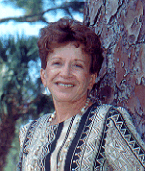

by
Sonia Pressman Fuentes


In 1990, after a routine mammogram, I was given the shattering news that I had breast cancer. I reached out blindly for help and one of the organizations I called was the American Cancer Society in Washington, D.C. There, as fate would have it, the woman who answered my call was a social worker named Wilma Scheuren. She was a person whose life was devoted to helping cancer patients. Her compassion saw me through the ordeal. As a result, after my mastectomy and chemotherapy, I remained interested in breast cancer and joined the American Cancer Society. As a feminist, it was only natural that I be involved in fighting a disease that affected primarily women. A couple of years later, I was elected to the Board of the D.C. chapter.
In 1992, I learned through my feminist activities that the Chinese Medical Association was promoting a two-week trip to China in early 1993 by individuals concerned with women's health. It was to be the First International Conference on Women's Health, with stops in Beijing, Shanghai, Suzhou, and Xian. The American Cancer Society agreed to let me go as its representative. I went to learn about the diagnosis and treatment of breast cancer and other cancers in China.
The group consisted of about one hundred fifty men and women from around the world. In addition to those from the United States and China, the roster included participants from places like England, Ecuador, Nigeria, Bangladesh, the Netherlands, Luxembourg, Tanzania, Indonesia, Ethiopia, Panama, Singapore, and New Guinea. I was one of two Jewish lawyers in the group; most of the other participants had significant backgrounds in the health fields, as doctors, midwives, nurses, professors, and other health professionals. Toward the end of March in 1993, shortly before my scheduled departure, I realized I'd be in China over Pesekh. On one of my calls to the organizer of the Conference in the United States, the Foundation for International Cooperation & Development, I mentioned casually my regret at missing a Seder while we were away. "Not to worry," the staffer said. "We're planning to have a Seder there." I couldn't understand how we could have a Seder in China. How would people find the ingredients for a Seder there? "Everyone will bring something from the United States," she said and assured me it would come to pass. She asked me to bring cinnamon and walnuts for the kharoset. In early April, when we arrived in Shanghai, there was much discussion as to where to hold the Seder. The Chinese Medical Association kindly offered us one of the offices in their headquarters building and it became the site.Shortly before the Seder, a number of the Jewish members of the group told me they would not be attending. They had more interesting things to do in Shanghai. On the other hand, a number of Christians asked me if they could possibly attend; it would mean so much to them, they said, to be able to participate in a Seder. We told them all would be welcome. And so on the night of April 5, 1993, nineteen members of the group came together for a Seder in Shanghai in the offices of the Chinese Medical Association. There were ten Jewish women, one Jewish man, five Catholic women (including a Franciscan nun), two Chinese men (one of whom was the head of the Chinese Medical Association) and one Chinese woman.
Somehow, we had the necessary ingredients. That night, we celebrated the exodus of the Jews from Egypt at a candlelight dinner in Shanghai. We had a Seder plate with kharoset, a roasted bone, a roasted egg in salt water, horseradish, and parsley. We drank Pesekhdike wine and ate matzos with gefiltefish. Our Chinese hosts brought baked chicken, cabbage, and rice. We did not have the heart to tell them that among Ashkenazi Jews rice was not appropriate for Passover.
We took turns reading from the Haggadah around the table in English and Hebrew, and we sang Hebrew and Yiddish songs. When the head of the Chinese Medical Association proudly read from the Haggadah, there wasn't a dry eye in the house. While I'm far from an expert on Jewish traditions, among the blind, the one-eyed woman is Queen. So, I gave a brief explanation of the meaning of the holiday, the passages we read, and the songs we sang.
None of us who were there will ever forget it.
After the service, as we left the building, I turned around and took one last look at the building where I had participated in such a meaningful service. To my amazement, I saw a MogenDoved on the building. "What is that?" I inquired of a member of the group who lived in Shanghai.
"That's the Star of David," she said. "This building used to be a synagogue."
When I returned home, I corresponded with the nun who had been on our trip, Sister and Doctor Miriam Devlin, Medical Director of the Bridgewell Corporation in Bucksport, Maine. She had written an account of the trip for a religious newspaper.
Here is what she wrote:| Also see "Graduating
With My Class" About the Author |